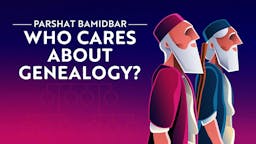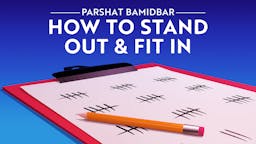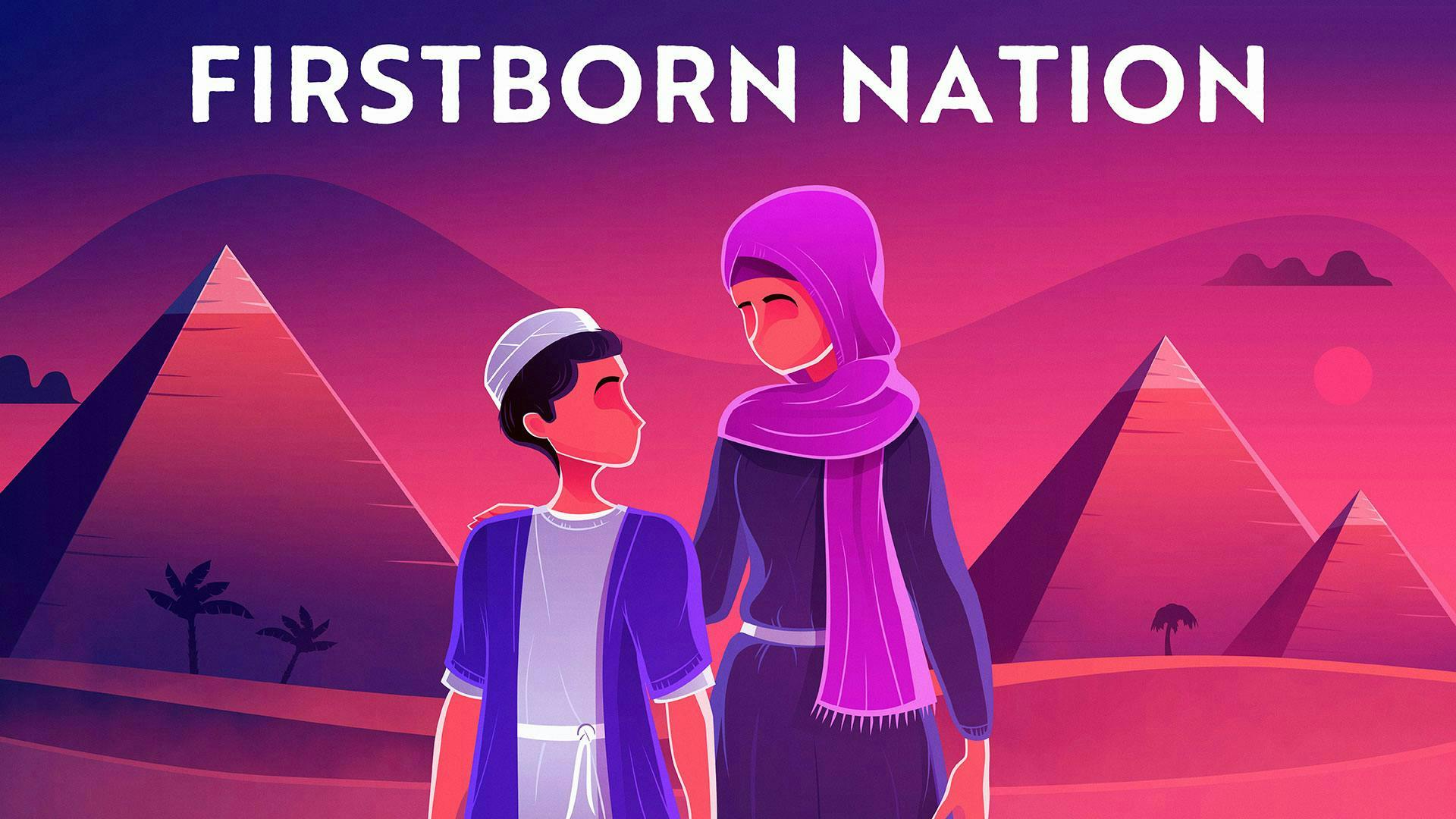Dvar Torah - Parshat Bamidbar
Why Were the Levites Chosen?
By Ari Levisohn | 13 March 2024 | 7 Minute Read
Why Are We Only Hearing About the Levites Now?
Welcome to the Book of Numbers
We've finally closed the book on Leviticus. We are done with sacrifices (korbanot), done with laws about priests (kohanim), and done with the intricate details of the tabernacle (mishkan) that took us half of Exodus and the entire Leviticus to cover. We can finally get into the more interesting stories of the travels in the desert, like Moses hitting the rock, the spies exploring Israel, and the rebellion of Korach.
A Strange Introduction to the Book of Numbers
But it doesn’t start with any of those stories. Instead, Numbers, beginning with Parshat Bamidbar, opens with a census of the entire nation of Israel. Then, the parsha tells us where each tribe will camp around the mishkan as they travel. And finally, there is a special focus on Levites. It would have made a lot of sense to talk about the Levites at the end of Leviticus, when we heard about the roles of the kohanim (priests). The kohanim are a subset of the tribe of Levi. So why not put this Levites section back there? We’re now in the book of Bamidbar, after all, which is Hebrew for “in the wilderness.” This is the book about the actual stories of the Israelites’ travels through the wilderness. Why are we still handing out roles in the mishkan?
What Was the Role of the Levites?
I think there must be a reason we are talking about the Levites' role in our parsha. The key to understanding this introduction of Bamidbar is through a deeper exploration into the exact position the Levites are appointed to. God tells Moses:
וַאֲנִי הִנֵּה לָקַחְתִּי אֶת הַלְוִיִּם מִתּוֹךְ בְּנֵי יִשְׂרָאֵל תַּחַת כָּל בְּכוֹר פֶּטֶר רֶחֶם מִבְּנֵי יִשְׂרָאֵל
I have taken the Levites from among Israel in place of every firstborn of Israel.
(Deuteronomy 3:12)
The Levites have some sort of spiritual role, to stand in for, or represent, the firstborn of Israel. But what would that mean? Well, what exactly does a bechor do?
The firstborn (bechor) plays a unique role in a family. Practically, he's the one closest in age both to the parents and to the rest of the children. Therefore, the bechor is in the best position to take the values of the parents and model them for the next generation. He's the transitional figure – the bridge.
In Rabbi David Fohrman’s book The Exodus You Almost Passed Over he talks about how God, Father of all humanity, says, בני בכורי ישראל, Israel is my firstborn. Rabbi Fohrman argues that this means that Israel’s duty is to transmit God's legacy to His other children, the nations of the world!
So it seems that the Levites are meant to act as the bechor—the bridge—between God and the people, to pass on God’s values to the entire nation, who, in turn, would pass those values on to the rest of the world. But we learned in Leviticus that the kohanim, too, are a bridge between God and the people. And among them, there's a kohen gadol, a high priest, who comes the closest to God when, once a year, he enters the Holy of Holies and encounters God. So now we have several sequential bridges in the transmission of godly values to the world, each passing on these values to the next.
- God
- The kohen gadol
- The rest of the kohanim
- The Levites
- The nation of Israel
- The nations of the world
A System of Bridges
The Torah is building a system of bridges, to ensure that God's values can be transmitted at every single step. Though the kohen gadol and the other priests are the first step in relaying God’s values to us, they can't really do that directly. They spend their days so close to God, and so removed from the rest of the nation, in the holy area of the mishkan, that there's a disconnect. We need another bridge—people like us to take God's values from the kohanim and bring them to the rest of us!
God tells Moses exactly that, that the Leviim can be that bridge. Moses is commanded to place the Leviim before Aaron.
וְשָׁמְרוּ אֶת מִשְׁמַרְתּוֹ…
And they should keep his charge…
(Deuteronomy 3:7)
But it is not just Aaron’s charge they should keep.
וְאֶת-מִשְׁמֶרֶת כָּל-הָעֵדָה…
…and the charge of the community.
(Ibid.)
God is explicitly spelling out both sides of the Levites' bridge. They are meant to perform duties for the priests, on the one hand, and the people, on the other. In fact, that phrase – שמר את משמרת – is used in Leviticus to describe the special role of the priests as well:
וּשְׁמַרְתֶּם אֶת מִשְׁמֶרֶת יְהוָה
And you shall keep the charge of God.
(Leviticus 8:35)
There is a progression: the Kohanim are meant to serve God, and the Leviim are supposed to serve the Kohanim and the people.
Now it makes so much sense why the Levites are appointed at the beginning of Numbers. As opposed to the last book and a half, which were all about the mishkan and the kohanim, this book is about the people of Israel themselves and the stories of their travels. But between the sections of the kohanim and the people we need to talk about the bridge between them: the Levites.
And in case you weren't convinced, Moses makes this role of Levites as “bridge” explicitly clear. At the end of the Torah, when blessing each tribe of Israel, Moses says to the Levites:
יוֹרוּ מִשְׁפָּטֶיךָ לְיַעֲקֹב, וְתוֹרָתְךָ לְיִשְׂרָאֵל
You shall teach the laws to the people of Jacob, and the Torah to Israel.
(Deuteronomy 33:10)
The members of the tribe of Levi are teachers; and a teacher is a bridge, responsible for transmitting God's values to the nation, so that Israel, in turn, can embody and spread them to the rest of the world.
What Does This Mean for Us?
So far, we have focused on the role of the Levites as the “firstborns” of the people acting as a bridge between them and the kohanim and God. But what about Israel’s role as God’s firstborn? How are we supposed to play that role among the nations of the world? It turns out that it's a lot more complicated than you might think. Rabbi Fohrman actually has a whole podcast series about this and the origins of God’s chosen nation. Check it out here.
More Parshat Bamidbar Videos

A Hidden Story For Teachers In The Genealogy Of Moses And Aaron
Video • 12 min
In Parshat Bamidbar, we read a genealogy of the families of the nation of Israel - but isn't that kind of boring? In this video, we get a closer insight into some strange verses about Aaron's family, and Rabbi Fohrman gives us insight into what it truly means to be a teacher.

The Paradox of the Individual and the Community
Video • 12 min
Every society faces a tension between communal cohesion and individual expression. The Book of Bamidbar’s opening census might just hold the answer for how to balance both of these essential ingredients to create an ideal community.
Parshat Bamidbar Pages
What is Aleph Beta?
Aleph Beta is a unique kind of Torah library. Led by our founder, Rabbi David Fohrman, we are dedicated to high-level, textual Torah learning for adults that is intellectually and spiritually sophisticated, that enlivens your Jewish practice and helps you forge a deeper connection to God. Whether you’ve been learning in yeshiva for years or you’re just beginning your Torah journey, you’re sure to find something meaningful and surprising waiting for you here.
Browse our library of over 1,000 beautifully produced animated videos, podcasts, deep dive courses, and printable guides. Topics include the weekly parsha, Jewish holidays & fast days, laws & mitzvot, prayers, relationships, big philosophical ideas and more. Have something to say at the Shabbos table that will amaze your family and guests and bring deep meaning into their lives.


